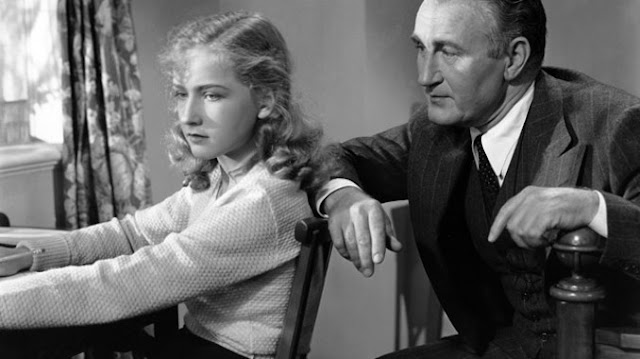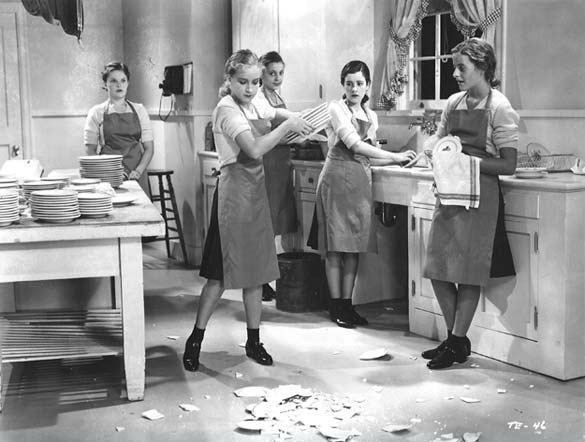"I can't understand why a man I'm so crazy about takes such a fiendish delight in tormenting me." - Bette Davis as Joyce Arden
"Love for breakfast. Love for lunch. Love for dinner."
When Henry confronts Basil about this dilemma, Basil offers to help. Especially to repay the debt Henry's father paid him when the stock market crashed back in 1929. As Basil and his butler and partner-in-crime Digges (Eric Blore) act out one of Basil's original plays, Henry has an idea. Basil should visit Marcia's family and cause such a ruckus that she'll fall out of love with him. It'll be exactly like a performance in a play! But there are two major obstacles awaiting Basil. He doesn't realize that the woman he's fooling with dramatics is the same fan who visited him in his dressing room on New Year's Eve. Also Basil promised Joyce that they'd get married on New Year's Day and she's about to throw his plans for a loop. Can Basil save Henry and Marcia's relationship and his own or will it all end in tragedy?
"From now on I doff the mantle of a Romeo and assume the role of a cad." - Leslie Howard as Basil Underwood
Based on the original story by Maurice Hanline called Gentlemen After Midnight, It's Love I'm After (1937) was directed by Archie Mayo for Warner Bros. The project was born out of Leslie Howard's request for a comedic vehicle. He needed a break after a succession of dramatic roles, one of them which happened to be Romeo in MGM's Romeo and Juliet (1936). Olivia de Havilland, a fairly new contract player for Warner Bros. had recently appeared in Mayo's Call It a Day (1937). Two years later de Havilland and Howard appeared in Gone With the Wind (1939) together, clinching their status as Hollywood legends. De Havilland was added to the cast pretty early on and in fact they started shooting scenes with her, Knowles, Howard and Blore even before a leading lady was secured.
Getting a leading lady for the film was easier said than done. Leslie Howard initially wanted Ina Clare or Gertrude Lawrence, two stage veterans, to appear opposite him. In the end, neither had the screen presence to be viable options. Howard had worked with Bette Davis in Of Human Bondage (1934) and the Archie Mayo directed movie The Petrified Forest (1936). The two didn't get along and Howard was hesitant about working with her again. But if they wanted an actress who sparkled on screen they could do no wrong with Davis. When Davis was cast, the production was already well on its way. In fact, a July 1937 issue of Screenland shows behind-the-scenes pictures of the making of the film but does not mention Bette Davis whatsoever. Her character appears more so at the beginning and end of the film so plenty of scenes could have been shot without her. Before It's Love I'm After, Davis was hospitalized for exhaustion. She took a tumble into the orchestra pit during the filming of the Romeo & Juliet scenes and suffered a minor injury.
When I came across this movie, I was immediately drawn by the star power. Davis, Howard AND de Havilland? Of course I had to watch this! All three play to their strengths. Davis as the tempestuous actress who runs hot and cold, Howard as an actor's actor and de Havilland as a starry-eyed youth with a tender heart; not a stretch for any of them by any means. And one of my favorite child actors, Bonita Granville, plays to her strengths as the bratty spoiled teenager.
But it's not Davis, nor Howard, nor de Havilland, nor Knowles nor even boisterous little Granville who steals the show. It's character actor Eric Blore. If you enjoy Fred Astaire and Ginger Rogers movies, Blore is a familiar face. He often played waiters and butlers and in It's Love I'm After he plays Digges, Howard's underpaid but devoted assistant. The script really gave Blore many moments to shine. He's got a lot of terrific scenes, delivers some great lines and serves as both straight man and comic throughout the story. He's the most sensible character but he's also caught up in the magic of the theater. Blore's Digges anchors the movie and I'd go so far as to say he's the #1 reason you should watch it.
It's Love I'm After (1937) is a zany film with lots of great witty one-liners and insults. Come for Leslie Howard, Bette Davis and Olivia de Havilland and stay for Eric Blore.
It's Love I'm After (1937) is available on DVD-MOD from the Warner Archive Collection. When you use my buy link you help support this site. Thanks!
Warner Archive Wednesday - On (random) Wednesdays, I review one title from the Warner Archive Collection. I purchased It's Love I'm After (1937) from the WB Shop.
















